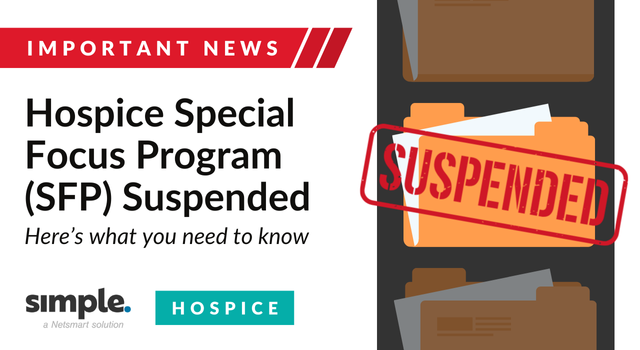Hospice Special Focus Program (SFP) Suspended
Understanding the SFP
The Hospice Special Focus Program (SFP), initiated by the Centers for Medicare & Medicaid Services (CMS), aims to enhance the quality of hospice care by identifying and monitoring hospices that perform poorly based on selected quality indicators[1].
This program is mandated by the Consolidated Appropriations Act of 2021 and seeks to ensure that hospices meet national health and safety standards, thereby improving care for patients and their families[1].
The SFP involves increased regulatory oversight and enforcement actions for hospices that fail to meet specific quality benchmarks[2]. These actions can include additional surveys, mandatory quality improvement plans, and, in severe cases, termination from the Medicare program[2].
The program's criteria and methodology are designed to identify hospices that pose a risk to patient care, ensuring they receive the necessary support and oversight to improve their services[1].
SFP Suspension & Related Lawsuit
On Feb 14, 2025, CMS and the Trump administration announced the suspension of the SFP to allow further evaluation of the program[3]. This decision comes amid a lawsuit filed by several hospice organizations against the U.S. Department of Health and Human Services (HHS). The plaintiffs, including state associations and individual hospices, argue that the criteria used to select hospices for the SFP are flawed and biased[4].
The lawsuit, filed in the U.S. District Court in the Southern District of Texas-Houston Division, challenges the SFP’s selection criteria, arguing that the algorithm disproportionately impacts larger providers by using outdated survey data and inaccurately weighting quality metrics[4].
The plaintiffs seek a preliminary injunction to halt the program, claiming it could misrepresent hospice compliance and negatively impact the quality and availability of care[5].
Implications for Hospice Care
The suspension of the SFP and the ongoing lawsuit highlight the complexities involved in regulating hospice care. While the program’s intent is to improve care quality, the methodology and criteria used must be fair and transparent to avoid unintended consequences for hospice providers.
This development could lead to significant changes in how the SFP is implemented and enforced, ultimately impacting the quality of hospice care nationwide.
As the situation evolves, hospice providers must remain vigilant and proactive. Staying informed through official CMS updates, engaging with industry associations, and preparing for possible changes in compliance requirements will be key.
This period of suspension might be an opportunity for providers to contribute to the dialogue on how best to measure and improve hospice care quality.
References
[1] Hospice Special Focus Program - CMS
[2] Overview of the Hospice Special Focus Program (SFP) | CMS
[3] [UPDATED] Trump Administration Suspends Hospice Special Focus Program
[4] Inside Hospice Organizations’ Special Focus Program Lawsuit Against HHS
[5] Hospice Organizations File Lawsuit to Halt Special Focus Program
About the author

Lisa Selman-Holman JD, BSN, RN, HCS-D, COS-C
Vice President, Clinical Services — McBee
Lisa Selman-Holman is the VP of Clinical Services at McBee, bringing over 39 years of expertise in home health and hospice. As a registered nurse and home care attorney, she specializes in regulatory compliance. Lisa has held various roles, from field nurse to executive, managing accreditation surveys, acquisitions, and regulatory crises. In 2004, she founded Selman-Holman & Associates, offering consulting, coding and OASIS review services. Lisa is a renowned educator, known for turning challenges into achievements. Joining McBee in 2021, she acts as VP of Clinical Services. In this role, Lisa oversees the clinical aspects of consulting projects, providing expert advice on clinical operations, quality improvement, patient care standards, and regulatory compliance to healthcare organizations, while also playing a key role in business development by identifying potential clients and shaping consulting proposals based on their clinical needs.
Click here to learn more about Post-Acute Academy from McBee.




